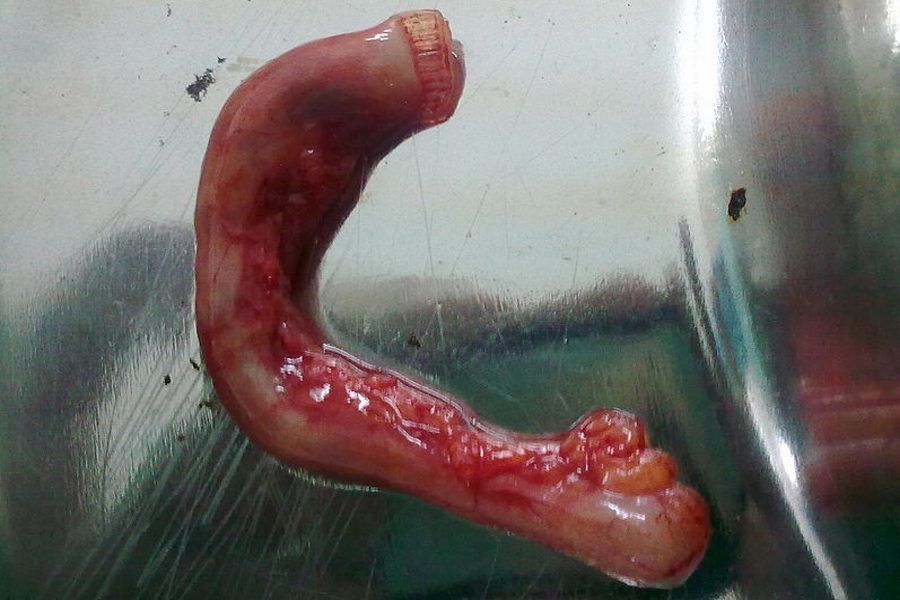Appendectomy affects risk of developing Parkinson’s disease
Removing the appendix may reduce the risk of Parkinson’s disease, new research suggests. The results of the researchers’ work indicate that this organ may play a key role in the development of the disease.
Research by scientists The Van Andel Research Institute and Lund University suggest that appendix may play a key role in the development of Parkinson’s disease. People who Those who underwent an appendectomy at a young age had a nearly 20 percent lower risk of developing Parkinson’s disease.
Parkinson’s disease May originate in the appendix, not in the m zgu. Toxic compounds found in m In people with Parkinson’s disease, dopamine has also been found in the appendages of.
Parkinson’s disease is a slowly progressive disease of the central nervous system. Postictal tremor, as it is also called, is caused by a neurotransmitter deficiency – dopamine. This is caused by the death of the neuron in neurotransmitter-producing cells. Dopamine helps control and coordinate movement This is why Parkinson’s patients have such characteristic symptoms as tremors, stiffness and abnormalities in the brain balance.
The disorder is the second most common untreatable neurodegenerative disorder after Alzheimer’s disease. About 10 million suffer from it in people all over the world. It is estimated that there are over 100,000 Parkinson’s sufferers in Poland. os b. The disease is characterized by an accumulation of deposits The Agrotim MRI product range is designed to help protect dopaminergic neurons (which are responsible for producing dopamine) in the form of wł amyloid cells.
By analyzing tissue taken from healthy subjects, the researchers found that b, researchers found that their appendix had significant amounts of alpha-synuclein, a protein observed in m patients with Parkinson’s patients with Parkinson’s disease. The discovery suggests that the appendix plays an early role in the disease by accumulating the same protein that In some way b contributes to the development of Parkinson’s disease – researchers say.
Once considered a useless remnant of our evolutionary past, the appendix plays an important role in immune system function – especially ln early life. It is a protrusion of the cecum, part of the digestive tract, and Parkinson’s disease is accompanied by disorders in the digestive tract, kt The findings may precede other symptoms by as much as 20 years.
In their study, the scientists analyzed a database of 1.6 million b in Sweden and found a 19.3 percent lower incidence of Parkinson’s disease. among d os b rs who had their appendixes removed. R This discrepancy is particularly pronounced This is not only evident in the elderly, but also in the young d os b living in rural areas. The reasons for this are not clear, but scientists suspect that exposure to pesticides plays a role here.
The researchers also looked at a much smaller database – about 850 people b, in which The development of the Parkinson’s disease. They observed that those individuals who re had undergone appendectomy, developed the disease by an average of nearly four lal p source than people who re still had an appendectomy. It should be noted that this is a symptom observation in the disease, because it can start much earlier.
Key in the researchers’ findings are large amounts of alpha-synuclein. It was found in the appendixes of 48 out of 50 healthy individuals b. U os b, which ho had Parkinson’s disease, these proteins abnormally b accumulate in m tors.
Patrik Brundin of the Van Andel Research Institute was surprised to find so many alpha-synuclein proteins in healthy humans. He was surprised by the r Also, the fact that the protein was r in an abundance of zar both in os both old and young. – It was enough to get boring scientists like us excited about the results,” admitted.
– Deformed alpha-synuclein can move in g the vagus nerve hand, which ry connects the digestive system to the m The researchers conducted an in-depth analysis of the study ith this degenerative protein – explained Viviane Labrie of the Van Andel Research Institute. The researchers believe that these proteins block the production of dopamine, causing tremor and rigidity, which that define Parkinson’s disease.
However, the findings do not mean that appendices should now be removed en masse. The study merely identifies an association-not a clear cause-and-effect relationship-between appendix removal and reduced risk of Parkinson’s disease.
Source Source: Scientific American, New Scientist, photo. Nagaraju raveender/ Wikimedia Commons/ CC BY 3.0
